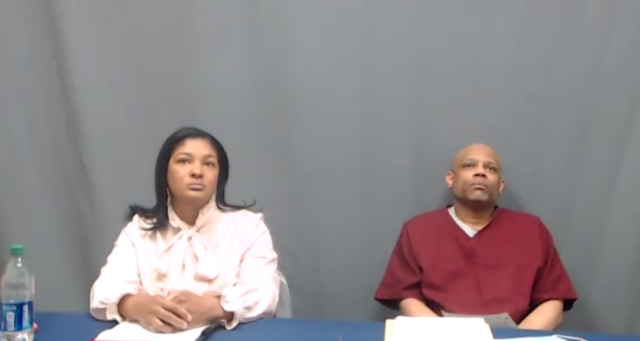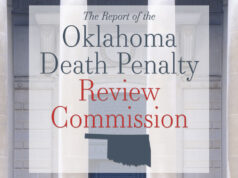

An emotional clemency hearing for what was described as a “heinous” crime resulted in the Oklahoma Pardon and Parole Board denying clemency for death-row inmate Donald Grant by a 4-1 vote.
Voting to reject Grant’s clemency petition were members Larry Morris, Kelly Doyle, Scott Williams and Richard Smothermon. Board Chairman Adam Luck voted for clemency.
“There’s a pattern in death penalty cases that we have seen since we began a couple months ago: severe mental illness, drug abuse, deprived and at times horrific childhood. I believe we will continue to see that,” Doyle said. “The people of Oklahoma have made a choice to maintain the death penalty. I also feel that it is my responsibility to identify those cases that are unusually heinous and cruel. And to me, this is one of those cases.”
Grant was convicted of the brutal 2001 murders of Brenda McElyea and Suzette Smith during a robbery at a La Quinta Inn in Del City. McElyea and Smith were both employees of the hotel. They were shot, beaten and slashed with a knife.
In the prior clemency hearing held Nov. 17 for death-row inmate Bigler Stouffer, the board recommended clemency by a 3-2 vote, citing concerns about the state’s lethal injection protocol. (Stitt has yet to announce a decision regarding Stouffer, who is scheduled to be executed Dec. 9.)
However, in today’s meeting, Doyle and Morris said the protocol is no longer their concern after Stouffer was denied his request for a stay of execution Nov. 23 by U.S. District Court Judge Stephen Friot. (Friot also ruled that Stouffer can have a clergy member in the execution chamber with him who can even lay hands upon Stouffer during the execution.)
Morris said during today’s hearing that he “certainly trusts” Friot’s judgment.
“To be clear, I have read his opinion on that subject several times and just want to go on the record and say that that is no longer a concern of mine based on the information that appeared in that hearing and the decision that [Friot] issued,” Morris said.
Grant admits guilt, references childhood and mental illness
Grant spoke in front of the board Tuesday along with federal public defender Susan Otto and assistant federal public defender Emma Rolls.
Otto and Rolls described Grant’s long history of diagnosed mental illness.
“Executing a brain-damaged and mentally ill man will not promote respect for the law. It will have the opposite effect,” Otto said. “When this case is measured against our current understanding and our current science, executing Donald Grant will stand against the tide of history. It does not represent the just exercise of society’s legitimate need to address criminal behavior. It is cruel, and it is inhumane.”
Grant spoke to the board for 20 minutes, at times stumbling heavily through his statements — admitting to the crime and asking for mercy.
“The crime that got me here, yes, I am guilty by charge. I don’t disclaim that,” Grant said.
Public Radio Tulsa reported that Grant’s mother, Mary Robinson, drank while she was pregnant with him. In 1989, he was removed from his mother’s custody by the state of New York for neglect.
During Tuesday’s hearing, Grant said he had to hide money from his mother because she became addicted to crack cocaine.
“I never had guidance. I never had the right people in my life,” Grant said. “I put my money in my socks and hid it from my mom because she smoked crack and she takes the money.”
Speaking for the state were retired chief of the Midwest City Police Department Brandon Clabes, who responded to the 2001 murder scene. A pair of assistant attorney generals, Caroline Hunt and Tessa Henry, also spoke on behalf of the state.
Otto and Rolls told the board that Donald Grant has active diagnoses of schizophrenia and bipolar I disorder. They said multiple doctors, at the time of his arrest, through trial and while on death row, declared him incompetent.
However, Hunt argued for the state that evidence showed that he was not experiencing a mental illness episode at the time of the murder. Hunt presented a letter from Grant where he targeted the La Quinta Inn and said his plan was to leave “no witnesses.”
“I’m sitting in the house cleaning my gun with kill on my mind for whose ever ass is there,” Hunt read from the letter.
Victim’s family gives emotional testimony
Family members of McElyea gave tearful speeches in front of the board, describing her as the “baby of the family” and a loving artist who wished to experience motherhood. McElyea’s sister, Shirl Pilcher, and her aunt, Sue Webster, asked that the board reject Grant’s clemency application. (Hunt said that, just before the hearing, Smith’s family decided not to speak in front of the board.)
Pilcher said reducing Grant’s sentence would be an injustice to the victims, the victims’ families and the court system.
“Evidence proves that Brenda and Suzette suffered greatly, they were terrorized, they feared for their lives and even begged for their lives,” Pilcher said. “Why should we care if Donald Grant suffers?”
When Pilcher found out a murder had happened at the hotel where McElyea worked, she began calling the hotel. The first call was answered by an unidentified man. When she identified herself, Pilcher said the man hung up.
“Additional calls went unanswered. And it was at that time that panic began to manifest within me,” Pilcher said. “I only learned of [my sister’s] death when I reached out to a previous manager she had worked for to confirm that Brenda’s hotel was, yes, the one that was hit and, yes, she was a victim of the homicide.”
Webster said she was the one who got McElyea started in her career at the La Quinta Inn.
“I just want justice for Brenda and Suzette,” Webster said as she began to weep. “[They] suffered a whole lot. If you believe in justice, I don’t know how you couldn’t deny a request.”
Death penalty opponents call Grant’s life story ‘horrific’
Following the board’s decision to deny Grant’s clemency request, The Rev. Don Heath from the Oklahoma Coalition to Abolish the Death Penalty released a statement.
“We are surprised and disappointed with the Pardon and Parole Board’s rejection of Donald Grant’s clemency request. Cases of mental illness are particularly appropriate for clemency,” Heath said. “Grant’s life story is horrific: prenatal brain injuries, a childhood filled with abuse, neglect and homelessness, no treatment for his mental illness until he is incarcerated. Death row is the most stable environment he has lived in. And it doesn’t matter. It reveals the extent to which our criminal justice system is broken that a 4-1 majority of the board could not show any mercy to a person who has had such a traumatic life.”
Owing to a pair of botched executions in 2014 and 2015, Oklahoma had not carried out a death sentence in nearly six years until John Marion Grant was executed Oct. 28. Gov. Kevin Stitt commuted the sentence of Julius Jones on Nov. 18, four hours before he had been scheduled to be the next person executed in Oklahoma.
Donald Grant is scheduled to be executed Thursday, Jan. 27, 2022.




















